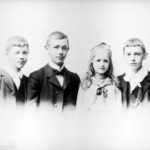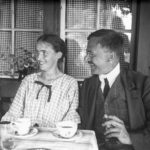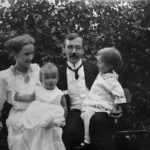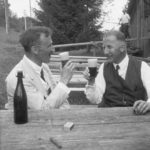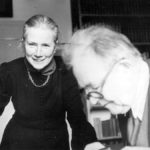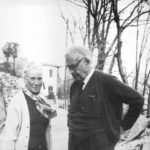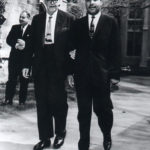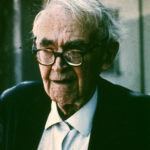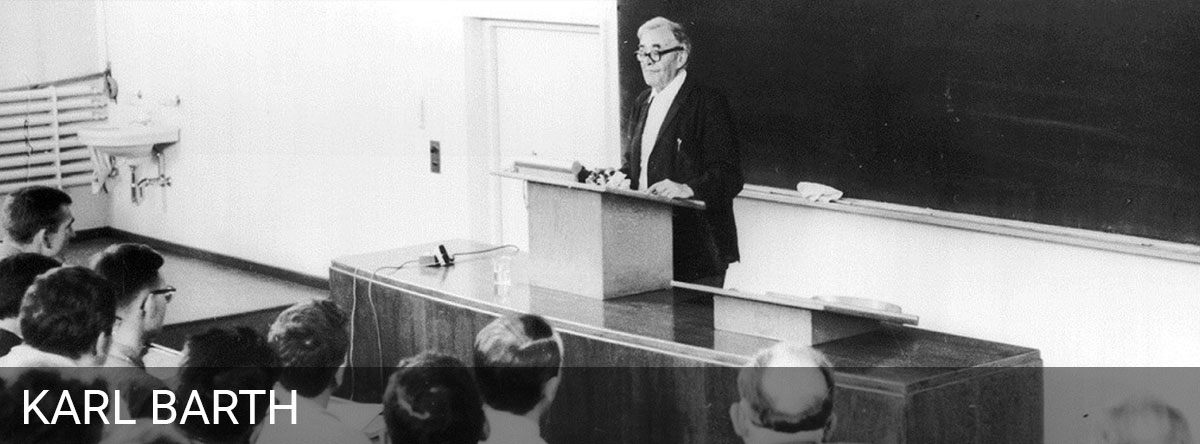Biography
Karl Barth (1886-1968) was the most important Swiss theologian of the twentieth century, with an influence far beyond Switzerland. He is considered alongside Thomas Aquinas, Jean Calvin, and Friedrich Schleiermacher to be one of the greatest thinkers within the history of the Christian tradition. Barth gave new impulses to Protestant theology during a critical phase, reshaping it fundamentally toward a systematic theology that had to cope with the grim realities of the 20th century. As the principal author of “The Barmen Declaration,” he was the intellectual leader of the German Confessing Church, the Protestant group that resisted the Third Reich. Barth’s writings have been translated into nearly every European language, as well as Russian, Japanese, Chinese, Korean, and more.
Early Life
Karl Barth was born on May 10, 1886, in Basel, Switzerland, as the eldest child of Fritz Barth, a Swiss Reformed minister, and Anna Katharina (Sartorius) Barth. His maternal grandmother he was related to the renowned historian Jacob Burckhardt. Followed by four siblings, Barth spent most of his childhood years in Bern, the capital of Switzerland, where his father had taken up a position as professor of New Testament and early church history. A troublesome child, “Karli” didn’t like going to school and for some time was the leader of a local street gang and engaged in feuds at school and in the neighborhood. In 1904, Barth set out to follow in the footsteps of his father and started to study theology at the University of Bern. Later on, he continued his studies in Germany at the universities of Berlin, Tübingen, and Marburg. Following his ordination he served as a pastor in Geneva (1909-1911) and in the small village of Safenwil (1911-1921). In 1913, Barth married Nelly Hoffman, a member of his first-year confirmation class in Geneva, with whom he had five children, one daughter and four sons.
Years in Germany and Second World War
In Safenwil, Karl Barth was pastor of a small country parish of blue-collar workers and was advocating for their education and social rights. During this time, Barth wrote the first version of his commentary The Epistle to the Romans, his commentary on the Apostle Paul’s Epistle to the Romans, which became a cornerstone of his life’s work. As a consequence of the international attention aroused by his commentary, Barth was appointed a professor at the University of Göttingen, Germany, in 1921, despite his lack of a doctorate degree.
In 1924, he met Charlotte von Kirschbaum (“Lollo”) who later became his long-time assistant and confidante. In 1929 Lollo moved in with the Barth family. This marked the beginning of a difficult 35-year-long household arrangement between Barth, his wife Nelly, and Lollo, putting a strain on everyone involved.
From 1925-1930, Barth worked as a Professor of Dogmatics and New Testament Exegesis in Münster and from 1930-1935 as a Professor of Systematic Theology in Bonn. In Bonn, he began his work on the Church Dogmatics, his magnum opus, which he left unfinished despite its more than 9,300 pages and thirteen total volumes.
Karl Barth manifested his fundamental opposition to National Socialism even before Adolf Hitler’s seizure of power in 1933 and decried the Nazis’ plans to use the German Church to legitimate their racist agenda. In June 1933, Barth published the first edition of his pamphlet Theological Existence Today!, which was widely perceived as an alarm and a wakeup call. In 1934, Barth was largely responsible for the writing of the Barmen Declaration, a confession of faith that vigorously repudiated Nazi ideology. Barth mailed this declaration to Hitler personally. The Barmen Declaration became one of the founding documents of the Confessing Church in Germany, which led the spiritual resistance against National Socialism.
In 1935, Barth lost his position as professor in Bonn and was forced to leave Germany because he refused to swear a pledge to Adolf Hitler without adding the qualification “to the extent that I responsibly am able as a Protestant Christian.” The authorities in Basel, Switzerland immediately appointed him Professor of Systematic Theology at the University of Basel, from where he continued to champion the causes of the Confessing Church, the Jews, and oppressed people everywhere. Barth stayed at the University of Basel until his retirement in 1962.
Later Life
After the end of the Second World War Karl Barth became an important voice in support both of German penitence and of reconciliation with churches abroad. In 1948, Barth was asked to deliver the main address at the first assembly of the World Council of Churches in Amsterdam, Netherlands, and he also played a significant role in the preparations for the second assembly in Evanston, Illinois, U.S., in 1954.
In the 1950’s, Barth made himself – as he put it – “disreputable” by his rejection of the nuclear arms race and by his efforts, in critical solidarity with Christians behind the “iron curtain,” to overcome the Cold War between East and West.
In 1962, shortly after retiring, Barth visited the United States for the first time at the age of 75, encouraged by his son Markus who worked as Professor of New Testament at the University of Chicago. Barth traveled across the country for seven weeks to deliver a series of lectures at Princeton Theological Seminary, the University of Chicago, Union Theological Seminary and San Francisco Theological Seminary. In Princeton, Barth had an encounter with the “courageous” Martin Luther King Jr., which Barth regretted was all-too-brief. That same year Barth was also featured on the cover of the Time magazine, which manifested that his influence had reached into mainstream American religious culture.
Karl Barth died on December 10, 1968 in his house on Bruderholz Lane in Basel. On the prior evening, he had cheered up his lifelong friend Eduard Thurneysen in a final phone conversation by saying, “Just don’t be so down in the mouth, now! Not ever! For things are ruled, not just in Moscow or in Washington or in Peking, but things are ruled – even here on earth—entirely from above, from heaven above.”
—Written by Barbara Zellweger
[All photos below are copyright of the Karl Barth-Archiv. Do not display, use, copy, or redistribute without permission.]
